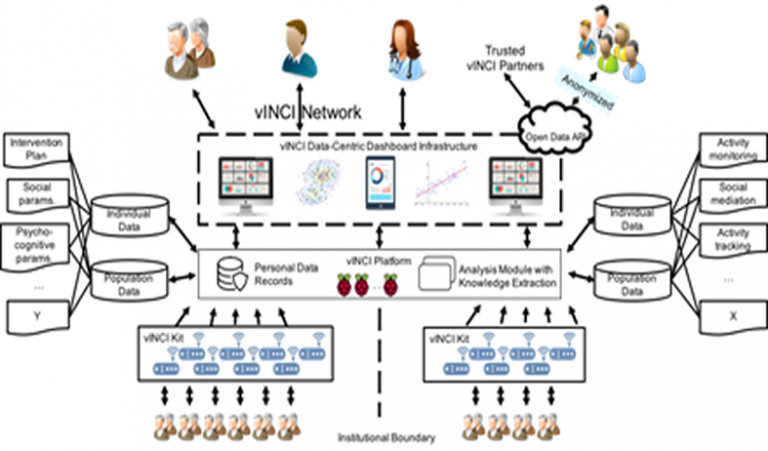Project Overview

OUR OBJECTIVES
vINCI proposes the development of an integrated and validated evidence-based Internet of Things (IoT) framework to deliver non-intrusive monitoring and support for older adults to augment professional health care giving. By integrating proven open-data analytics technology with innovative user-driven IoT devices in four standardized kits, and with business models, vINCI aims to assist caregivers and provide smart care for older adults at out-patients clinics and outdoors. To verify, test (clinical validation), and identify its added value, two multi-disciplinary controlled pilots (in Romania and Cyprus) and two open-call validations (in Poland and Slovenia) will be deployed in controlled environments for real-life use cases involving older adults across Europe. The final goal is to demonstrate a systematic approach to ensure the highest level of quality control, automated monitoring, and data governance.
PROJECT OVERVIEW
vINCI’s aim is to enhance older adults’ active ageing and, as a result, their QoL through technology. vINCI will measure older adults’ QoL at the recruitment stage through the validated questionnaire. The project target older adults with and without Mild Cognitive Impairments for exploration of several QoL domains: life overall; health; social relationships; independence; control of life and freedom; home and neighbourhood; psychological and emotional wellbeing; financial circumstances; leisure and activities. vINCI will develop an IoT-based eco-system to deliver non-intrusive monitoring and care support for older adults. Personal sensed data will be securely monitored starting from sensors (e.g. detecting physical and social activity), coupled with data gathered from wearable devices (e.g. smart watch, smart clothing/shoes). To form a true information ecosystem (the vINCI network), IoT endpoints will furnish standards-driven communication protocols combined with sophisticated data aggregation and analytics techniques. Adequate models will be developed to assess older adult QoL profile, identify impairments associated with old age, and help aging people get a sense of independence. Traditional medical services will be augmented with monitoring capabilities, such that the caregiver will have access and track exercises, activities, health status, being able to adapt the caregiving procedures against variables designed to lead to an increase in the level of wellbeing, QoL and perceived health.
the end-users target
vINCI targets as primary end-users older adults aged 65+. Secondary end-users are the caregivers targeted in vINCI:
- Relatives and informal carers;
- Professional caregivers;
- Tertiary end-users are stakeholders such as medical doctors, physiotherapists, social services, to be included in vINCI through interoperability means.
EXPECTED RESULTS AND IMPACT
vINCI does not only improve older adults’ QoL through reinforcing their mood, but also by satisfying the general needs of the adult. vINCI will provide technologies to support more independent living, helping older adults feel more secure when taking a walk in the park, doing daily activities at home, or enjoying an independent life style. The technology will blend in their surroundings, putting little pressure on the older adults’ experience (when seniors are afraid that they will be unable to handle technology, they are unlikely to use it). At the same time, the caregiver (or assisting personnel) will not need to accompany the older adult, giving him an advanced sense of freedom. The budgetary constraints imposed by the constant caregiving activities will also be reduced, because the medical staff will be able to monitor constantly more than one adult during them talking their usual daily activities.

